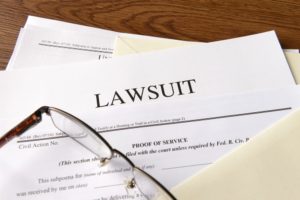
One of the mechanics lien’s powers is the ability to provide the claimant with multiple avenues to recovery – it gets more skin in the game. Usually, if a party is forced to recover through a lawsuit, that plaintiff can only bring the suit against the party that owed him/her the money and nobody else.
Without a mechanics lien, a subcontractor is generally limited to filing suit against the GC that has not paid them. But that’s not the case with a mechanics lien: a subcontractor with a mechanics lien could recover unpaid amounts from the project owner.
When mechanics liens are not available, the general remedy likely comes down to the effectiveness of a lawsuit to recover the amount due. There are many questions surrounding such a lawsuit, however. This is further complicated by the fact that many pay if paid or other risk shifting mechanisms are routinely found in construction contracts, which could further erode the ability to recover through a lawsuit.
Against Whom Could a Lawsuit be Filed?
The most obvious party to sue would be the GC that owes the money. The effectiveness of this lawsuit would be at least partially governed by a couple of different factors:
1) the performance and quality of the work;
2) the applicability and effectiveness of any risk shifting or other contractual clauses purporting to limit recovery.
One common such clause would be a pay-if-paid clause. The enforceability of such a clause is determined on a state-by-state basis, subject to various factors governing its interpretation. To the extent such a clause is enforceable, it may limit your recovery if the GC hasn’t been paid. As a practical matter, if the GC hasn’t been paid yet either, they also presumably want payment and could rope the owner into the suit by making a claim against the owner for their own payment.
As an example of how this may play out, in Virginia, the applicability of the pay-if-paid clause itself is subject to a determination of the intent behind the clause. Virginia generally takes a relatively unique approach to determining the validity of a pay-if-paid clause. Pay-if-paid clauses are both not specifically banned outright, and not subject to specific “magic language” that renders them enforceable. Rather, the court looks to the intent of the parties and whether the subcontractor understood that by signing the contract they would be bearing the risk of not getting paid if the owner didn’t pay the general contractor?
Further Reading: “What Does a Construction Lawyer Do? Do You Need One?”
While the GC likely wants to get paid – and may file suit against the owner to do so – is there anything that mandates that action (especially since the GC may have an obligation to you, as well)? In the absence of some collusion between the GC and the owner to limit your ability to recover for the work you performed, it is unlikely that the GC could be forced to file suit to recover. The GC can make a business decision as to whether the lawsuit to recover is desirable or whether it would be acceptable to just write-off the debt. This means that you can’t “force” payment to the GC in order to obligate them to pay even with the pay if paid clause.
But what about other parties? Could a lawsuit be filed against the owner under an unjust enrichment (or a quantum meruit) cause of action?
This is also a state-by-state determination that can get very tricky very quickly. For the purposes of this example, let’s stick with Virginia. The Virginia Supreme Court has held that the viability of a claim for quantum meruit is determined by whether there exists a direct contract for the work. So, if the work that purportedly gives rise to the unjust enrichment claim against the third part owner is the same work contemplated by a written agreement (with some other party), the unjust enrichment claim is barred. However, there is definitely some uncertainty surrounding this particular determination.
Long story short, the best plan in situations moving forward is to send required preliminary notices and protect the right to file a lien (and file the lien if unpaid). Here, the recovery against the GC likely depends on the enforceability of the pay if paid clause, and the recovery against the property owner on the determination of an unjust enrichment claim can apply. It’s a mess, and while things happen to make notices and liens slip by sometimes, it’s a mess that can be avoided or significantly cleaned up with a thorough lien and notice policy and if needed, a proper lien claim.


